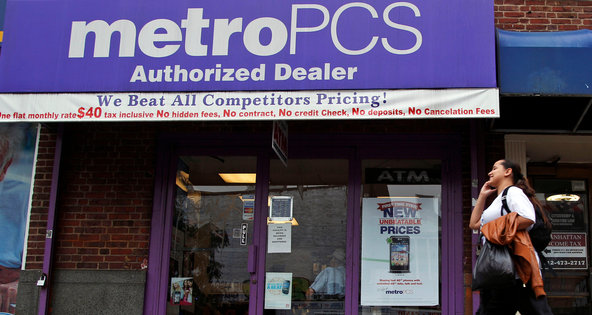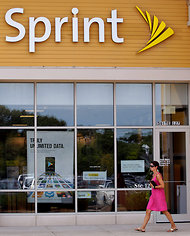 Mary Altaffer/Associated PressA MetroPCS store in Manhattan.
Mary Altaffer/Associated PressA MetroPCS store in Manhattan.
There are three fundamental things to know about the deal between MetroPCS and T-Mobile USA.
First, this is really just an acquisition of MetroPCS by Deutsche Telekom. After the transaction is completed, Deutsche Telekom, the German telecommunications behemoth, will own 74 percent of the combined company, which will be renamed T-Mobile. MetroPCS’s public shareholders will own the rest.
Second, though Deutsche Telekom is acquiring MetroPCS, this is also a way for Deutsche Telekom to undertake a reverse initial public offering for T-Mobile. Deutsche Telekom may be acquiring control of the combined MetroPCS and T-Mobile, but it wants to exit this business eventually. If the transaction goes through, expect Deutsche Telekom to sell those shares to the public over time.
Deal Professor
View all posts
Third, because this is really an acquisition, it puts MetroPCS, one of the few national mobile carriers, very much in play.
The deal structure is not that of a typical merger where a buyer simply acquires the target. It is instead a recapitalization. A recapitalization is a fancy term that means the rejiggering of a company’s capital structure.
The restructuring part is Deutsche Telekom’s contribution of the T-Mobile business to MetroPCS in exchange for 74 percent of the share capital of the combined business. And because this is categorized as a recapitalization, the contribution of the shares is tax free to Deutsche Telekom.
 Stephan Savoia/Associated PressT-Mobile’s deal to buy MetroPCS turns up the pressure on Sprint Nextel.
Stephan Savoia/Associated PressT-Mobile’s deal to buy MetroPCS turns up the pressure on Sprint Nextel.
The net effect is that Deutsche Telekom is acquiring control of MetroPCS.
But don’t expect Deutsche Telekom to hold on to the shares for long. As Rene Obermann, the company’s chief executive, acknowledged on an investor call, this is also a way for Deutsche Telekom to gain liquidity for its T-Mobile interest. Mr. Obermann called the transaction a “turbo I.P.O.” By doing it this way, Deutsche Telekom saves on I.P.O. costs, and also has an asset that is more easy to sell since it has greater scale.
There are also some bells and whistles on the transaction. There is a $1.5 billion dividend to MetroPCS shareholders to give them an incentive to vote for the share issuance to T-Mobile. There is also a 2-for-1 reverse stock split of MetroPCS shares. The parties didn’t disclose why, but the reverse stock split is likely to push the MetroPCS stock price back above $10 after the large dividend and keep up appearances. The stock split also has the convenience of ensuring that MetroPCS has enough authorized shares to issue to Deutsche Telekom.
MetroPCS will also restructure its debt, and Deutsche Telekom has committed to lending the new entity as much as $6 billion more in financing on top of the $15 billion the combined entity will owe Deutsche Telekom.
But it is the structure of the transaction that puts MetroPCS up for sale.
Under Delaware law, the deal is viewed as a sale because Deutsche Telekom is obtaining majority control of MetroPCS. This puts the MetroPCS board into “Revlon-land” (referring to a 1985 Delaware decision in a takeover battle over Revlon), requiring the board to obtain the highest price reasonably available for the sale of the company.
This is an open invitation for another bidder to come in and pay a higher amount, something the MetroPCS board must accept if it a clearly superior offer.
Deutsche Telekom’s main fear here is likely to be a move by Sprint. Earlier this year, MetroPCS had previously thought it had a deal with Sprint, but the Sprint board pulled out at the last minute.
MetroPCS is reported to be — surprise! — not unhappy that this new deal may spur Sprint to come to the table. And because Revlon duties apply, MetroPCS’s board is now bound to take the highest price reasonably available. If MetroPCS takes this offer, it must pay a $150 million termination fee to Deutsche Telekom.
Notably, Deutsche Telekom tried to deal with this issue by putting a “force the vote” provision in the transaction agreement. MetroPCS cannot terminate this deal even if a competing bid is made unless the company holds its shareholder vote and shareholders vote no. Before then, only Deutsche Telekom can terminate the deal even if MetroPCS’s board recommends a competing bid. And Deutsche Telekom will have five business days to match any competing bid before MetroPCS’s board can even make such recommendation change.
This will not deter a Sprint bid, but it will make it harder to complete and give Deutsche Telekom more time to respond to any competing bid.
Ultimately, the structure of the transaction was likely driven by the fact that Deutsche Telekom wanted liquidity but MetroPCS could not pay the cash necessary to acquire T-Mobile. The contribution is therefore a stepping stone to such liquidity, but Deutshe Telekom is now forced to accept this risk of a competing bid.
The next move is up to Sprint.
Either way, the real winners may be Deutsche Telekom’s lawyers and investment bankers. Their fees are likely to come out of the $3 billion in cash that ATT paid to Deutsche Telekom in connection with ATT’s thwarted attempt to purchase T-Mobile. And if this transaction also fails, these lawyers and bankers are also likely to be paid some part of their fees, leaving them teed up to take a run at a third transaction.
Steven M. Davidoff, writing as The Deal Professor, is a commentator for DealBook on the world of mergers and acquisitions.
Article source: http://dealbook.nytimes.com/2012/10/04/why-metropcs-is-truly-in-play/?partner=rss&emc=rss

Speak Your Mind
You must be logged in to post a comment.